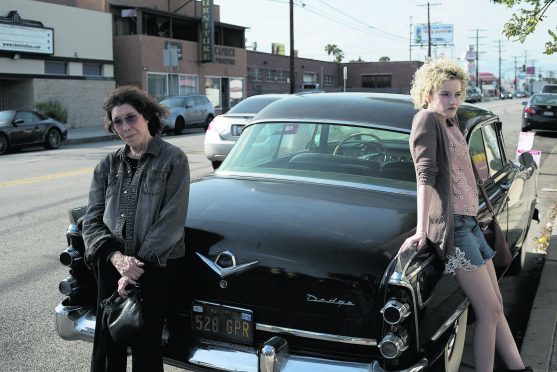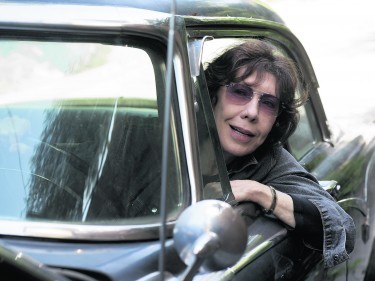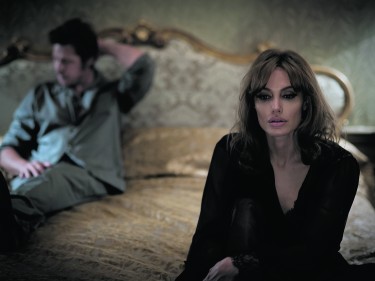GRANDMA (15)
4 stars
In 1980, a group of rosy-cheeked children from St Winifred’s Roman Catholic Primary School in Stockport famously topped the UK Christmas singles chart with There’s No One Quite Like Grandma.
The cherubic moppets rejoiced: “She always has a smile, she never hurries us along . . .”
The lead character in Paul Weitz’s delightful comedy drama sticks up two fingers to that beatific image of patience and enduring grace in old age.
Portrayed with gusto by Lily Tomlin, this grandma is a potty-mouthed whirling dervish, who spits in the eye of political correctness, clobbers a rude teenager with a hockey stick and openly discusses her bodily functions, oblivious to the potential embarrassment of passersby.
It’s a meaty, eye-catching role full of vim that could deservedly land the Detroit-born actress a second Oscar nomination.
Weitz’s film is also blessed with a nuanced supporting performance from Julia Garner as a granddaughter who acts tough but is ill-prepared for the harsh reality of life when it bites her and draws blood.
Lesbian poet Elle (Lily Tomlin) is slowly coming to terms with the death of her long-term partner, Vi.
She lashes out and coldly terminates a fledgling romance by telling her girlfriend Olivia (Judy Greer): “You’re a footnote.”
Soon after, Elle’s 18-year-old granddaughter, Sage (Julia Garner), arrives in search of money.
“I need $630. I’m pregnant,” reveals the teenager, who has booked an appointment at an abortion clinic, but doesn’t have the funds for the procedure.
Nor does Elle, but that doesn’t stop the grandmother from jumping into her car with Sage and tearing around Los Angeles to call in unpaid debts and beg for cash.
Initially, they visit Sage’s slacker boyfriend Cam (Nat Wolff), whose scruffy appearance and laissez faire attitude to birth control rankles Elle.
“Some people shouldn’t grow beards because it makes their face look like an armpit,” she snarls.
Further pit-stops include a transgender tattoo artist called Deathy (Laverne Cox), Elle’s ex-husband Karl (Sam Elliott) and Sage’s workaholic mother, Judy (Marcia Gay Harden), who writes e-mails while walking on a treadmill-desk.
As the deadline for the abortion approaches, Sage’s emotional dam breaks.
“If you don’t cry about this, what the hell are you gonna cry about?” sympathises Elle.
Grandma is a slight, yet entertaining, character study, anchored by Tomlin’s formidable turn as a fiercely independent woman, who continues to blaze a trail in her later years.
She catalyses delightful screen chemistry with Garner and Elliott, aided by a script peppered with sparkling one-liners.
Weitz’s unhurried and unfussy direction allows the focus to remain on the cast as they wrestle with their characters’ manifold dilemmas and make peace with their momentous decisions.
BY THE SEA (15)
2 stars
Achingly cool style casts a disdainful glance at substance in Angelina Jolie Pitt’s languorous examination of marital discord set in a 1970s resort in the south of France.
The vicarious thrill of observing one of the world’s most famous celebrity couples blur reality for their art as a husband and wife in turmoil, quickly evaporates when it becomes evident that the script and a robust plot are the least of the film’s trifling concerns.
An unintentionally hilarious opening line of dialogue – “I smell fish!” – delivered with utmost seriousness by the director, writer and leading lady, sets the tone for By the Sea.
The period detail is impeccable, from the sleek convertible that delivers the couple to their sun-baked Mediterranean idyll to the pristine designer luggage that accommodates the numerous costume changes that herald each overwrought scene.
Tears flow freely, sending dark rivulets of non-waterproof mascara down Jolie Pitt’s cheeks as she shields her eyes from the midday sun behind large Yves Saint Laurent glasses.
When Pitt’s long-suffering spouse quietly informs one of the French locals that “she’s not so easy to love,” we share his pain.
Every frame is speckled with woe.
With a running time of just over two hours, that’s a lot of misery and self-loathing.
By the Sea opens with New York author Roland (Brad Pitt) and his wife, Vanessa (Angelina Jolie Pitt), arriving at a hotel, where he hopes the sea air will unclog his writer’s block. Tension between the couple is palpable.
“Have a nice day,” Roland tells his wife as he heads down to the hotel bar to trade stories with bartender Michel (Niels Arestrup).
“I won’t,” laments Vanessa.
“I know,” sighs her husband.
The air of melancholy lifts momentarily when newlyweds Francois (Melvil Poupaud) and Lea (Melanie Laurent) check in to an adjacent suite and Vanessa discovers a hole in the wall that allows her to spy on the new arrivals, who hop into bed with frenzied regularity.
At first, this voyeurism seems to stoke the smouldering embers of Vanessa and Roland’s dormant desire.
However, her fixation on the couple next door errs dangerously close to a voracious and all-consuming obsession.
“I don’t think I like this game any more,” Roland warns his self-destructive wife.
By the Sea is undone by a plodding, impotent script that struggles to verbalise the central couple’s turmoil.
“I like belonging to something, someone,” remarks Vanessa in one of the film’s more lucid moments.
Protracted scenes of Jolie Pitt lounging morosely on her balcony pass without incident, casting us as the increasingly impatient voyeurs of a woman on the verge of a nervous breakdown.
When the big reveal finally comes and we learn of the reason for the wife’s suffering, it’s an anguished cry in the dark that fails to curry our sympathy.


